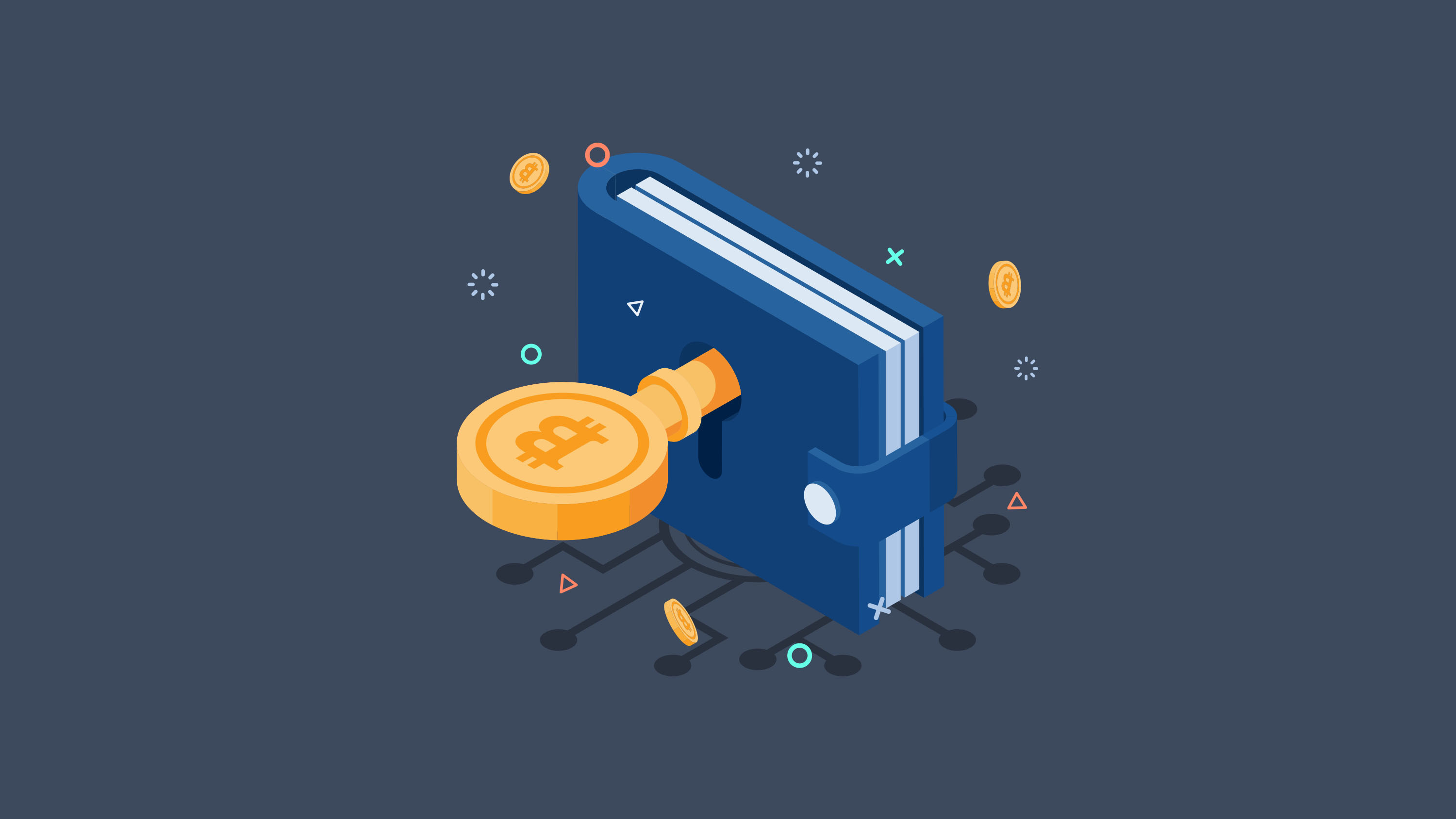In the world of cryptocurrency, a blockchain wallet is an essential tool that allows you to store, manage, and transact with your digital assets. But what exactly is a blockchain wallet, and how does it work? Let’s take a closer look.
When you think of a wallet, you’re probably used to the idea of a physical, leather-bound object that holds your cash and cards. In the realm of blockchain technology, however, wallets take on a whole new meaning. These wallets are essentially digital wallets that provide a secure and convenient way for individuals to store and access their cryptocurrencies.
There are two main types of blockchain wallets: hot wallets and cold wallets. Hot wallets are connected to the internet and generally offer more convenience, while cold wallets are offline and provide an extra layer of security. Both types of wallets use public and private keys to authenticate transactions and ensure the safety of your digital assets.
So, how exactly does a blockchain wallet work? When you create a wallet, you’ll be provided with a unique seed phrase or recovery phrase. This seed phrase is a randomly generated sequence of words that serves as the master key to your wallet. It’s important to keep this seed phrase safe and secure, as it can be used to restore your wallet in case of loss or theft.
Once you have your wallet set up, you can use it to send, receive, and store various cryptocurrencies. When you make a transaction, your wallet uses your private key to sign it and verify your ownership of the digital assets. The transaction is then broadcasted to the blockchain network, where it is confirmed and added to the public ledger.
At Kriptomat, we believe that blockchain wallets are an essential tool for anyone entering the world of cryptocurrencies. That’s why we’ve developed a user-friendly wallet that makes it easy to manage your digital assets securely. Whether you’re new to cryptocurrency or a seasoned investor, our wallet provides a seamless experience for all your blockchain needs.
- Wallets Manage Cryptography
- Securing Your Digital Assets
- Private and Public Keys
- Types of Wallets
- Hardware Wallets
- Software Wallets
- Web Wallets
- An Innovative Alternative
- Mobile Wallets
- Paper Wallets
- It’s up to You
- Considerations for Choosing a Wallet
- Working with Multiple Wallets
- Frequently Asked Questions:
- What is a blockchain wallet?
- How does a blockchain wallet work?
- What are the types of blockchain wallets?
- Are blockchain wallets secure?
- Can I have multiple blockchain wallets?
- What happens if I lose my blockchain wallet?
- Video:
- How Cryptocurrency ACTUALLY works.
Wallets Manage Cryptography
When you think about cryptocurrency, it is important to understand that it is not physically stored anywhere. Instead, it exists only on the blockchain. So, how do you access your cryptocurrency and manage your funds? That’s where wallets come in.
Wallets are digital tools that allow you to interact with the blockchain network and manage your cryptocurrency. There are different types of wallets, including software wallets, hardware wallets, and online wallets like Kriptomat. Regardless of the type, the main purpose of a wallet is to provide you with an account that allows you to send, receive, and store your cryptocurrency securely.
One of the key features of blockchain technology is its reliance on cryptography. In the context of wallets, cryptography is used to secure your transactions and ensure the privacy and integrity of your funds.
When you create a wallet, it generates a unique pair of cryptographic keys: a public key and a private key. The public key is like your account number, while the private key is like your password. These keys are mathematically related, but it is computationally impossible to derive the private key from the public key.
When you want to receive cryptocurrency, you share your public key with the sender. They use your public key to encrypt the transaction data, which can then only be decrypted by the corresponding private key. This ensures that only you can access the funds sent to your wallet.
Similarly, when you want to send cryptocurrency, your wallet uses your private key to sign the transaction, proving that you are the rightful owner of the funds. The signature is then verified by the blockchain network, and if it matches the public key associated with the wallet, the transaction is considered valid.
One important thing to note is that wallets do not actually store the cryptocurrency itself. Instead, they store the keys that allow you to access and manage your cryptocurrency on the blockchain. This means that even if you lose access to your wallet, as long as you have your private key or a recovery seed, you can always recover your account and access your funds.
So, next time you find yourself wondering “What is a blockchain wallet and how does it work?”, remember that wallets are the tools that allow you to manage the cryptography behind your cryptocurrency transactions. They provide you with a secure and convenient way to interact with the blockchain network and keep your funds safe.
Securing Your Digital Assets
Securing your digital assets is of utmost importance when it comes to blockchain wallets. Since cryptocurrencies are stored digitally, it is crucial to take necessary precautions to keep them safe from theft or loss. Here are some key steps to secure your digital assets:
- Choose a Strong Password: When creating a blockchain wallet, make sure to choose a strong and unique password. Avoid using common passwords or personal information that can be easily guessed.
- Backup Your Seed: Blockchain wallets generally provide a seed or recovery phrase that serves as a backup to restore your wallet in case of loss or theft. Make sure to write down this seed and store it in a safe place, preferably offline.
- Enable Two-Factor Authentication: Two-factor authentication adds an extra layer of security by requiring a second verification method, such as a fingerprint or a code sent to your mobile device, to access your account.
- Keep Software Updated: Regularly update your blockchain wallet software to ensure you have the latest security patches and features.
- Use Hardware Wallets: Consider using hardware wallets, which are external devices dedicated to storing cryptocurrencies. These wallets offer offline storage and are considered highly secure.
- Be Cautious of Phishing Attacks: Be vigilant and avoid clicking on suspicious links or providing your wallet credentials on untrusted websites. Phishing attacks are a common way for attackers to gain unauthorized access to your wallet.
- Public and Private Keys: Understand the concept of public and private keys. Public keys are used to receive funds, while private keys are used to access and transfer funds. Keep your private keys secure and do not share them with anyone.
- Diversify Your Assets: Consider diversifying your cryptocurrency holdings across multiple wallets or accounts. This reduces the risk of losing all your assets if one wallet is compromised.
- Choose Reputable Wallet Providers: When selecting a wallet provider, do thorough research and choose reputable and trusted providers like Kriptomat. Consider user reviews, security features, and the track record of the provider.
- Educate Yourself: Stay informed about the latest security best practices and developments in the cryptocurrency world. The more you know, the better equipped you are to secure your digital assets.
Remember, securing your digital assets is a continuous process. Stay proactive and remain cautious to ensure the safety of your cryptocurrencies on the blockchain.
Private and Public Keys

In the world of cryptocurrencies and blockchain technology, the concepts of private and public keys play a crucial role in ensuring the security and integrity of your digital assets. Whether you are using a wallet provided by kriptomat or any other service, understanding private and public keys is essential.
Private keys are like the key to your account. They are a randomly generated string of characters that serve as a unique identifier for your wallet. Think of it as a password that gives you access to your cryptocurrency. It is important to keep your private key secure and never share it with anyone. If someone has access to your private key, they can control your wallet and transfer your cryptocurrency without your consent.
On the other hand, public keys are derived from private keys and serve as your wallet’s address. It is this address that you share with others when you want to receive cryptocurrency. This means that anyone who wants to send you cryptocurrency needs to know your public key/address.
When someone wants to send you cryptocurrency, they use your public key to create a transaction. This transaction is then signed with their own private key, ensuring that only they can authorize the transfer. Once the transaction is signed and broadcasted to the blockchain, it can be validated by others in the network.
In addition to private and public keys, wallets also make use of something called a seed phrase or recovery phrase. This is a combination of words that allow you to recover your wallet if you forget your password or lose access to your device. It is important to keep your seed phrase secure and never share it with anyone.
There are different types of wallets that use private and public keys, such as hardware wallets, software wallets, and web wallets. Hardware wallets store your private keys offline, making them more secure against online threats. Software wallets are applications installed on your computer or mobile device, while web wallets are accessed through a web browser.
That’s a basic overview of private and public keys in the context of blockchain wallets. It is important to understand these concepts and take appropriate measures to protect your cryptocurrency. Remember, if you don’t control the private keys, you don’t really own the cryptocurrency.
Types of Wallets

When it comes to managing your cryptocurrency, there are several different types of wallets to choose from. Each type of wallet has its own features and provides different levels of security and convenience. Let’s take a look at some common types of wallets:
- Software Wallets: These wallets are applications that you can install on your computer or smartphone. They are convenient to use and allow you to access your cryptocurrency account from anywhere with an internet connection. Examples of software wallets include the Kriptomat wallet and the popular Exodus wallet.
- Hardware Wallets: These wallets are physical devices that store your cryptocurrency offline. They provide an extra layer of security as they are not connected to the internet when not in use. Popular hardware wallets include Trezor and Ledger. If you think you will be storing a large amount of cryptocurrency for an extended period, a hardware wallet may be a good option for you.
- Paper Wallets: As the name suggests, paper wallets involve printing out the public and private keys of your cryptocurrency account on a piece of paper. Paper wallets are secure because they are not connected to the internet, but they can be easily damaged or lost. They are not as popular anymore due to the rise of software and hardware wallets.
- Online Wallets: These wallets are provided by cryptocurrency exchanges or online platforms. They allow you to store your cryptocurrency in your account on the platform. While online wallets are convenient for trading and accessing your funds quickly, they are also more prone to hacking and security breaches. It is generally recommended to keep only a small amount of cryptocurrency in an online wallet.
- Brain Wallets: These wallets are created by remembering a secret passphrase or seed. The seed is used to generate the public and private keys of your account. Brain wallets are convenient because you don’t need to carry any physical devices, but they can be risky if the passphrase is not strong enough or if it is stored insecurely.
These are just some of the most common types of wallets available in the cryptocurrency world. Each wallet type has its own advantages and disadvantages, so it’s important to understand what you’re looking for in a wallet before making a decision. No matter which type of wallet you choose, always make sure to prioritize security and protect your private keys.
Hardware Wallets
Hardware wallets are physical devices specifically designed to securely store cryptocurrencies. They provide an extra layer of security compared to other types of wallets, making them an ideal choice for those who want to protect their investments.
The main advantage of a hardware wallet is that it keeps your private keys, which are necessary to access your cryptocurrency, offline. This means that even if your computer or mobile device is compromised, your funds will still be safe.
When you set up a hardware wallet, you will generally be given a seed phrase, consisting of a series of words. This seed phrase acts as a backup, allowing you to recover your funds in case you lose your device.
To send or receive cryptocurrency, you will connect your hardware wallet to your computer or mobile device. This connection is usually done through a USB cable or via Bluetooth. Once connected, you can use your wallet’s interface to manage your funds.
Hardware wallets support multiple cryptocurrencies and are compatible with different blockchains. Some popular hardware wallet brands include Ledger, Trezor, and KeepKey. These wallets often come with their own software applications, making it easy to interact with your cryptocurrency.
There are two main types of hardware wallets:
- Single-currency wallets: These wallets are designed to support a specific cryptocurrency. They are a great choice if you mainly hold one type of cryptocurrency.
- Multi-currency wallets: These wallets can support multiple cryptocurrencies. They allow you to manage different digital assets in one place, which can be convenient if you have diverse investments.
When using a hardware wallet, it’s important to think about where you store it. Keep it in a safe place, as it physically holds the keys to your cryptocurrencies. If you lose the device or it gets damaged, you may lose access to your funds if you don’t have a backup.
While hardware wallets provide a high level of security, they aren’t completely immune to risks. It’s important to protect your seed phrase, as someone with access to it can steal your funds. Additionally, be cautious when purchasing a hardware wallet and buy from reputable sources to avoid counterfeit devices.
In conclusion, hardware wallets are a secure and reliable way to store your cryptocurrency. Whether you’re an experienced crypto investor or just getting started, having a hardware wallet can give you peace of mind knowing that your funds are safe and under your control.
Software Wallets
Software wallets are digital wallets that allow you to store and manage your cryptocurrencies without relying on a physical device. They are typically installed on your computer or mobile device and provide a user-friendly interface for managing your digital assets.
With a software wallet, you have complete control over your funds and can access them anytime, anywhere, as long as you have an internet connection. You can send and receive cryptocurrencies, view your transaction history, and manage your account settings.
Software wallets generate a public and private key pair for each cryptocurrency you own. The public key is used to receive funds, while the private key is used to sign transactions and prove ownership of the funds. The private key should be kept secret to protect your funds from unauthorized access.
There are different types of software wallets available, ranging from basic wallets for beginners to advanced wallets with additional security features. Some popular software wallets include:
- Desktop Wallets: These wallets are installed on your computer and offer a high level of security. They can be further categorized into full-node wallets and light wallets. Full-node wallets store a copy of the entire blockchain on your computer, while light wallets rely on external servers to access the blockchain.
- Mobile Wallets: These wallets are designed to be installed on your mobile device, allowing you to manage your cryptocurrencies on the go. They offer convenience and accessibility, but may not provide the same level of security as desktop wallets.
- Web Wallets: These wallets are accessed through a web browser and are generally easy to use. They are convenient but may be less secure compared to desktop wallets since they rely on third-party servers.
- Hardware Wallets: While software wallets are stored on your computer or mobile device, hardware wallets are physical devices that store your private keys offline. They offer the highest level of security since they are less vulnerable to malware attacks. However, they require an initial investment and are not as convenient to use compared to software wallets.
When setting up a software wallet, you will usually be provided with a seed phrase or recovery phrase. This is a series of words that can be used to restore your wallet in case your device is lost or damaged. It is important to keep your seed phrase in a safe and secure place, as anyone with access to it can gain control of your funds.
So, if you’re new to cryptocurrencies and want to start using them, software wallets are a great option. They allow you to easily manage your digital assets and provide the flexibility to access your funds whenever you need them.
Web Wallets
A web wallet is a type of cryptocurrency wallet that is accessed through a web browser, without the need to download any software. This makes web wallets a convenient option for users who want to manage their cryptocurrency funds on the go, without having to worry about software compatibility or device storage.
Web wallets are generally hosted by a third party, and the private keys and seed phrases required to access the wallet are stored on their servers. This means that users do not have direct control over their private keys, which can be a concern for those who prioritize security.
One of the key advantages of web wallets is that they are usually easy to set up and use. Users can simply sign up for an account, and then access their wallet by logging in with their username and password. This ease of use makes web wallets a popular choice for beginners who are new to cryptocurrency and blockchain technology.
Web wallets also offer a range of features, such as the ability to send and receive funds, view transaction history, and manage multiple cryptocurrency accounts. Some web wallets also offer additional security features, such as two-factor authentication, to protect against unauthorized access.
However, there are some risks associated with using web wallets. Since the private keys and seed phrases are stored on a third-party server, there is a risk of the server being hacked or compromised. In addition, if the web wallet provider shuts down or experiences technical difficulties, users may temporarily or permanently lose access to their funds.
When using a web wallet, it is important to choose a reputable provider and take additional security precautions, such as enabling two-factor authentication and regularly backing up your private keys. It is also recommended to only store small amounts of cryptocurrency in a web wallet, and transfer larger amounts to a more secure offline storage option, such as a hardware wallet.
In conclusion, web wallets offer a convenient option for managing cryptocurrency funds without the need for software downloads. They are generally easy to set up and use, making them a popular choice for beginners. However, users should be aware of the security risks associated with web wallets and take appropriate precautions to protect their funds.
An Innovative Alternative

Without a blockchain wallet, you generally can’t interact with cryptocurrencies like Bitcoin or Ethereum. But that’s where innovative alternatives like the Kriptomat wallet come in.
What sets the Kriptomat wallet apart from other types of wallets is its user-friendly interface and seamless integration with the Kriptomat cryptocurrency exchange. With this wallet, you can easily buy, sell, and store various cryptocurrencies without any hassle.
One of the key advantages of using the Kriptomat wallet is that it allows you to have full control over your funds. Unlike a traditional bank account, where the bank holds your money, the Kriptomat wallet gives you direct access to your cryptocurrency funds. This means that you’re the only one who can initiate transactions and manage your account.
Another innovative feature of the Kriptomat wallet is its use of public and private keys. Similar to other blockchain wallets, the Kriptomat wallet generates a unique set of public and private keys for each user. These keys are essential for securely managing and accessing your cryptocurrency funds.
Furthermore, the Kriptomat wallet supports the use of seed phrases. A seed phrase is essentially a backup password that can be used to recover your wallet in case of loss or theft. This provides an added layer of security and ensures that you can always regain access to your funds even if you lose your device or forget your password.
Overall, if you’re looking for a user-friendly and secure way to interact with cryptocurrencies, the Kriptomat wallet is definitely worth considering. Its innovative features and seamless integration with the Kriptomat exchange make it a convenient option for both beginners and experienced cryptocurrency users.
Mobile Wallets

When you think of wallets, you generally think of physical wallets that hold your cash and cards. In the digital world, a wallet serves a similar purpose, but instead of holding physical money, it holds digital currency or cryptocurrencies.
Mobile wallets are a type of digital wallet that you can use on your smartphone or tablet. They provide a convenient and secure way to store, manage, and transact with your cryptocurrencies on the go. If you’re someone who prefers to have access to your cryptocurrencies wherever you are, mobile wallets are a great option.
There are different types of mobile wallets available, ranging from custodial to non-custodial wallets. Custodial wallets are provided by third-party companies like exchanges, such as Kriptomat, which handle the security and storage of your cryptocurrencies on your behalf. On the other hand, non-custodial wallets give you full control over your cryptocurrencies and require you to manage your own private keys.
One key feature of mobile wallets is their ability to generate and store a seed phrase, also known as a recovery phrase or backup phrase. A seed phrase is a series of random words that can be used to recover your wallet in case your device gets lost, stolen, or damaged. It is important to keep your seed phrase secure and never share it with anyone. Losing your seed phrase means losing access to your cryptocurrencies permanently.
Another important aspect of mobile wallets is their compatibility with different blockchains. Public blockchains like Bitcoin, Ethereum, and many others have their own unique addresses and protocols. Mobile wallets allow you to store multiple cryptocurrencies by supporting different blockchains, making it easier for you to manage your diverse crypto portfolio.
In conclusion, mobile wallets are a popular choice for cryptocurrency enthusiasts who want to have access to their digital assets at all times. They provide convenience and security while allowing you to store and manage multiple cryptocurrencies. Whether you choose a custodial or non-custodial wallet is up to your personal preference and level of comfort in managing your own private keys.
Paper Wallets

A paper wallet is a type of cryptocurrency wallet that allows you to store your seed or private keys offline. It is called a paper wallet because the keys are typically printed on paper rather than being digitally stored.
When you create a paper wallet, you generate a random seed or private key using a trusted offline generator. This seed is used to generate your public addresses, which you can use to receive cryptocurrency.
The main advantage of a paper wallet is that it is not connected to the internet, making it less vulnerable to hacking or online attacks. This offline storage method provides an extra layer of security for your funds.
To use a paper wallet, you can simply import the private keys into a compatible wallet when you want to access your funds. You can do this by using a wallet app that supports importing paper wallets or by manually entering the private keys.
It’s important to keep your paper wallet safe and secure, as losing it means losing access to your funds. Here are a few tips to ensure the safety of your paper wallet:
- Keep multiple copies of your paper wallet in separate secure locations.
- Protect your paper wallet from physical damage, such as water or fire.
- Consider laminating your paper wallet to increase durability.
- Avoid storing digital copies or photos of your paper wallet, as they can be easily compromised.
Although paper wallets offer enhanced security, they are not the most user-friendly option. They require users to manually enter private keys, which can be prone to human errors. Additionally, paper wallets do not offer convenient features like easy balance checking or transaction history.
If you’re new to cryptocurrencies and want a simple and user-friendly way to store your digital assets, there are other types of wallets available. For example, online wallets like Kriptomat provide easy-to-use interfaces and additional features, such as account management and quick access to your funds.
In conclusion, paper wallets are a secure offline storage option for your cryptocurrency. They provide an extra layer of protection against online threats. However, they may not be suitable for users who prefer convenience and easy access to their funds. Make sure to consider your personal preferences and needs when choosing a wallet type.
It’s up to You
When it comes to choosing a blockchain wallet, you have plenty of options. You can think of it like choosing a wallet in the physical world. The wallet acts as a place to store your money and other valuable items, and you want to make sure it’s secure and easy to use.
At Kriptomat, we provide a user-friendly and secure wallet for storing your cryptocurrencies. Our wallet is compatible with multiple blockchains, including Bitcoin and Ethereum, so you can manage all of your assets in one place.
If you’re new to cryptocurrencies, you may be wondering what the difference is between a public key and a private key. The public key is like your account number – it’s the address where other people can send cryptocurrencies to. The private key, on the other hand, is like your password – it’s used to access and manage your account. It’s important to keep your private key secure and never share it with anyone.
When you create a wallet, you will generally be given a seed phrase. This is a series of words that you can use to recover your account in case you lose access to your wallet. It’s important to write down your seed phrase and keep it in a safe place, as it is the only way to recover your account.
There are different types of wallets available, including hardware wallets, desktop wallets, mobile wallets, and web wallets. Hardware wallets are physical devices that you can connect to your computer or smartphone to store your cryptocurrencies. Desktop wallets are software applications that you can install on your computer, while mobile wallets are apps that you can download and install on your smartphone. Web wallets, like the one we offer at Kriptomat, are online wallets that you can access from any device with an internet connection.
So, that’s what a blockchain wallet is and how it works. It’s a secure and convenient way to store and manage your cryptocurrencies. Whether you’re a beginner or an experienced cryptocurrency user, having a wallet is essential for participating in the world of digital assets.
Considerations for Choosing a Wallet
When it comes to choosing a wallet for your cryptocurrency, there are a few important considerations to keep in mind. Here are some factors you should think about before making a decision:
- Security: One of the most important factors to consider when choosing a wallet is security. You want to make sure that your wallet keeps your funds safe and secure from potential hackers. Look for wallets that offer strong encryption, two-factor authentication, and other security features.
- Convenience: Another consideration is convenience. You want a wallet that is user-friendly and easy to navigate. Consider the interface of the wallet and how easy it is to perform transactions and manage your account. Some wallets may have additional features that make the user experience more convenient, such as the ability to buy or sell cryptocurrency directly from the wallet.
- Compatibility: It’s also important to consider compatibility. Some wallets are only compatible with certain types of cryptocurrencies, so make sure that the wallet you choose supports the specific cryptocurrencies you’re interested in. Additionally, consider whether the wallet is compatible with your device, such as desktop, mobile, or web-based wallets.
- Control: Consider the level of control you want to have over your funds. Some wallets, like hardware wallets, offer full control over your private keys, while others, like web-based wallets, may have custodial control of your funds. Determine how much control you want and choose a wallet accordingly.
- Community Support: It can be helpful to choose a wallet that has a strong community support. This can be beneficial for troubleshooting issues, finding resources and tutorials, and staying up to date with the latest wallet developments.
Ultimately, the decision of which wallet to choose depends on your personal preferences and needs. It’s important to do your research, understand the different types of wallets available, and carefully consider the factors mentioned above. By finding a wallet that meets your requirements, you can ensure a secure and convenient experience in managing your cryptocurrency.
Working with Multiple Wallets

When it comes to managing your cryptocurrency, it’s common to have multiple wallets. There are several types of wallets available, each with its own unique features and functionalities. Whether you’re a beginner or an experienced trader, it’s important to understand how to work with multiple wallets to keep your funds safe and organized.
Types of Wallets:
- Hardware Wallets: These are physical devices that store your cryptocurrency offline, providing maximum security.
- Software Wallets: These are digital wallets that are usually accessible via desktop or mobile application.
- Online Wallets: These are wallets that are accessed through a web browser and are generally hosted by a third party.
Without a wallet, you cannot interact with blockchains and send/receive cryptocurrency. Each wallet has its own unique address, which is similar to a bank account number, allowing you to send and receive funds.
Managing Multiple Wallets:
When working with multiple wallets, it’s important to keep them organized and secure. Here are some tips:
- Use a Password Manager: Use a password manager to securely store and manage the passwords for your different wallets.
- Backup Your Wallets: Create a backup of your wallets regularly, which usually includes a seed phrase or recovery phrase. This will allow you to restore your wallets if you lose access to them.
- Keep Track of Your Wallets: Keep a record of your wallet addresses and the corresponding cryptocurrencies they hold.
- Be Mindful of Security: Be cautious when entering your wallet address to avoid any mistakes that could result in the loss of funds.
It’s also important to note that you can have multiple wallets for different purposes. For example, you may have one wallet for long-term storage, another for everyday spending, and another for trading on exchanges.
Overall, understanding how to work with multiple wallets can help you manage your cryptocurrency more effectively. By keeping your wallets organized and secure, you can have peace of mind knowing that your funds are safe.
At Kriptomat, we provide a user-friendly platform that allows you to create and manage multiple wallets effortlessly. Sign up for an account today and start exploring the world of cryptocurrency!
Frequently Asked Questions:
What is a blockchain wallet?
A blockchain wallet is a digital wallet that allows users to manage and store their cryptocurrencies securely. It is a software application that provides users with the ability to send, receive, and store digital assets on the blockchain.
How does a blockchain wallet work?
A blockchain wallet works by leveraging the technology of the blockchain. It generates a pair of cryptographic keys – a public key and a private key. The public key is used to receive funds, while the private key is used to sign transactions and access the funds. When a transaction is made, it is broadcasted to the network and confirmed by miners, ensuring the integrity and security of the transaction.
What are the types of blockchain wallets?
There are several types of blockchain wallets, including hardware wallets, software wallets, paper wallets, and mobile wallets. Hardware wallets are physical devices that store the user’s private keys offline. Software wallets are applications that can be installed on computers or mobile devices. Paper wallets are physical printouts of the user’s private and public keys. Mobile wallets are applications that can be installed on smartphones and provide convenience and accessibility.
Are blockchain wallets secure?
Blockchain wallets can be secure if certain precautions are taken. It is important to choose a reputable wallet provider and ensure that the wallet has proper security features, such as encryption and two-factor authentication. Additionally, users should keep their private keys safe and avoid sharing them with anyone. Using hardware wallets can provide an extra layer of security by keeping the private keys offline and protected from potential online threats.
Can I have multiple blockchain wallets?
Yes, it is possible to have multiple blockchain wallets. Having multiple wallets can provide additional security and organization for different types of assets or transactions. Users can choose to have different wallets for different cryptocurrencies or divide their funds into separate wallets for different purposes.
What happens if I lose my blockchain wallet?
If you lose your blockchain wallet, it can result in the loss of access to your funds. This is why it is crucial to back up your wallet and keep your private keys in a safe and secure place. With some wallets, you can use a recovery phrase to regain access to your funds in case of loss or theft. However, it is important to note that not all wallets have this feature, so it is essential to research and choose a wallet that provides appropriate backup and recovery options.
Video:
How Cryptocurrency ACTUALLY works.








